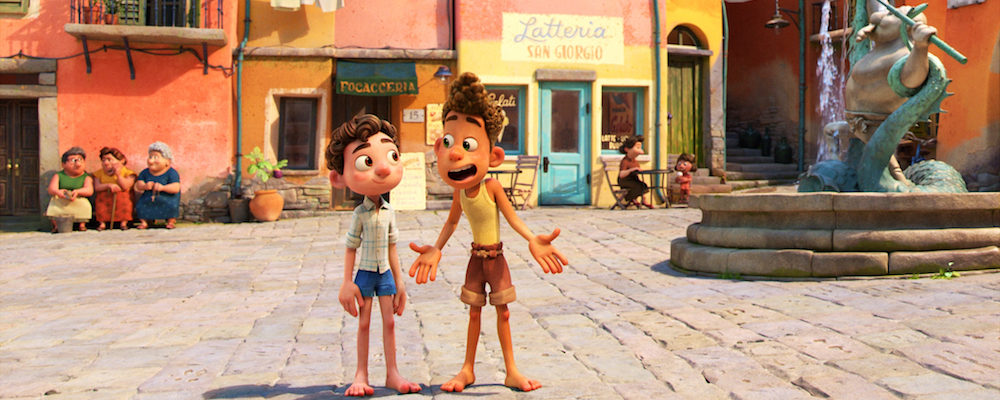‘Luca’ Takes a Delightful Summer Vacation With Monsters and Lots of Heart
Alci Rengifo
There are some films that can almost be called seasonal. They could be enjoyed at any time of the year, but fit best during a particular mood. Pixar’s “Luca” defines a summer film in its sun-kissed textures and breezy fables. It’s a monster story and a tribute to that romantic idea of ‘50s and ‘60s Italy. Compared to other Pixar productions, this is a smaller offering, with the feeling of something light concocted by animators during a free weekend. As tends to be the case with family entertainment, the message being transmitted is fairly simple and wholesome. The delivery is what matters and director Enrico Casarosa makes his feature directorial debut packed with small pleasures.
It all begins underwater near the Italian coast, where pre-adolescent sea monster Luca (Jacob Tremblay) spends his days shepherding fish and living with parents Daniela (Maya Rudolph) and Lorenzo (Jim Gaffagan). Never do they go into the surface or they will be hunted by another monster, humans. Luca is extremely curious, however, and while swimming around bumps into Alberto (Jack Dylan Grazer), a fellow monster who brazenly spends all his time on the surface, where they can instantly transform into humans. It’s a kind of chameleon reflex. Alberto introduces Luca to all the joys of life on a small island, including magazines with photos of a Vespa scooter. Luca immediately becomes obsessed with getting one. Feeling bold, they decide to swim over to the village of Portorosso. It is there that the locals hold a great race which promises enough money for the boys to buy their own Vespa. The local champ is an obnoxious bully named Ercole Visconti (Saverio Raimondo). But the boys soon make friends with aspiring champion Giulia (Emma Berman), who reluctantly agrees to take them on her team. Now Luca and Alberto just need to avoid getting wet or their cover will be blown.
Pixar’s work with Disney has always grabbed attention for its grand gestures, but downsizing brings its own rewards. “Luca” may not travel into the future like “Wall-E” or ponder mortality like last year’s fantastic “Soul,” but its enjoyment comes from spending time in its world. Casarosa and the animation team are having fun spinning a quick tale that gives them an excuse to visit an isolated Italian spot. Portorosso looks like an homage to the Italian villages in films like “Il Postino” or “Call Me by Your Name.” Radios play Italian pop from the era and maybe Ercole Visconti’s last name is a wink at the great Italian auteur Luchino Visconti. The world of “Luca” is one of enjoyable and funny folksiness, like Giulia’s kind-hearted giant of a father, the one-armed Massimo (Marco Barricelli), who happens to also hunt sea monsters. Massimo has a grumpy cat, Machiavelli, who shares his mustache. Underwater Luca’s world is a submerged copy of the surface. He herds small fish like sheep while his working-class parents worry for his safety. They also live with a vivacious grandma who encourages Luca. Even more memorable is Uncle Ugo (who marks a hilariously brief voice cameo by Sacha Baron Cohen), a transparent monster from the very deep who needs to get his heart punched back to life over a lack of oxygen in the higher reaches.
In some ways “Luca” is family entertainment that will let kids bask in an era before iPhones and videogames, where for Luca and Alberto danger can mean sneaking off to another town. There’s a welcome exuberance in telling a story that doesn’t depend on robots or big tech. Luca and Alberto just want to win the race’s prize money, but if it rains or if they fall into any sort of watery area, they will transform back into their monstrous selves. Giulia also introduces Luca to the world of books and astronomy, which instantly make him desperate to attend school. It’s surely a recycled plot device, but in terms of what is being offered to a younger audience barely learning to read, it’s not the worst a film could offer. Giulia is also written as a real equal to the boys. She doesn’t need them to save her. She’s the one showing them the ropes.
As the big race approaches “Luca” gets better and better, allowing its story to build into some great little set pieces that are themselves winks at classic cinema. There’s a moment by the sea where someone’s sea monster identity is exposed with operatic flair, and a train scene closes the film with the kind of heartfelt emotion you would get in “Roman Holiday.” Adult readers can guess how the movie ends and will find few surprises, but this is also not a thoughtless movie. “Luca” is a sincere, wonderfully imagined fable. It contains that same old message that we should all get along and learn to accept our neighbors, and to build genuine friendships that go beyond superficial appearances. Add some friendly sea monsters, a grumpy cat, fresh sea breezes and pasta, and you have a perfect summer getaway.
“Luca” begins streaming June 18 on Disney+.

